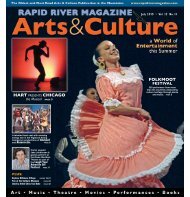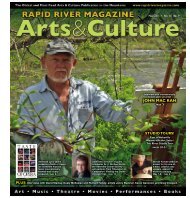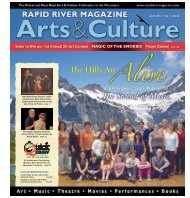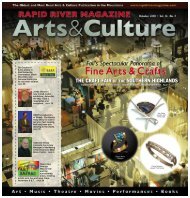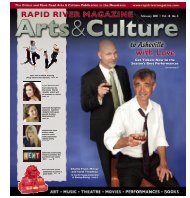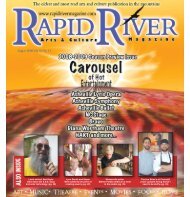winners of our annual poetry contest - Rapid River Magazine
winners of our annual poetry contest - Rapid River Magazine
winners of our annual poetry contest - Rapid River Magazine
Create successful ePaper yourself
Turn your PDF publications into a flip-book with our unique Google optimized e-Paper software.
R A P I D R I V E R A R T S & C U L T U R E M A G A Z I N E<br />
artful living<br />
Kindness As Religion<br />
Growing up, as a Christian, my great<br />
confusion concerning religion<br />
was simply that I could not find<br />
enough kindness in it. I understood<br />
fully the instructions <strong>of</strong> Jesus<br />
to love y<strong>our</strong> neighbor, to forgive, to do for<br />
the least among us, to practice tolerance.<br />
In my childish understanding, this is<br />
what religion was supposed to be. What I<br />
could not find was much evidence <strong>of</strong> these<br />
teachings in the practice <strong>of</strong> religions. I know<br />
that many others have experienced the same<br />
confusion and disillusionment.<br />
My disillusionment led to a rejection<br />
<strong>of</strong> religion and all things spiritual, but this<br />
left what is sometimes referred to as a “God<br />
shaped hole” in my life; as I speculate it does<br />
for others. Without<br />
“My religion is kindness.”<br />
~ The Dalai Lama<br />
Without a spiritual<br />
understanding at the center<br />
<strong>of</strong> a person's life, something<br />
elemental is missing.<br />
BY BILL WALZ<br />
a spiritual understanding<br />
at the<br />
center <strong>of</strong> a person’s<br />
life, something<br />
elemental is missing.<br />
St. Augustine<br />
spoke <strong>of</strong> this archetypal<br />
need, describing it as, “Humanity’s<br />
innate desire for the infinite.”<br />
In the 1600’s, the philosopher Pascal<br />
also described this fundamental human requirement<br />
in this way: “What else does this<br />
craving, and this helplessness, proclaim but<br />
that there was once in man a true happiness,<br />
<strong>of</strong> which all that now remains is the empty<br />
print and trace? This he tries in vain to fill<br />
with everything around him, seeking in<br />
things that are not there the help he cannot<br />
find in those that are, though none can help,<br />
since this infinite abyss can be filled only<br />
with an infinite and immutable object; in<br />
other words by God himself.”<br />
What is this “infinite” that humanity<br />
seeks, this “God?” These are questions<br />
humanity has struggled with since emerging<br />
from caves, and it is perhaps humanity’s<br />
greatest dilemma and challenge. The human<br />
species’ entire orientation to life, society and<br />
Nature is in the balance. Religion has been<br />
given the responsibility to answer these<br />
questions, but for the most part, sadly, <strong>of</strong>ten<br />
tragically, has failed the challenge.<br />
Although it can be difficult to see in<br />
a world divided into the camps <strong>of</strong> those<br />
where religion is separated from the secular<br />
and political, and those that believe in political<br />
theocracies, the failure <strong>of</strong> organized religion<br />
to answer these questions is ultimately<br />
modern humanity’s greatest crisis.<br />
It is this loss <strong>of</strong> connection to the<br />
infinite that has left the majority <strong>of</strong> modern<br />
humanity experiencing an existential “abyss”<br />
they attempt to fill with materialism, personal<br />
importance, political and/or religious<br />
affiliation. That these attempts are failures is<br />
evident in the cruelty, competition, exploitation<br />
and divisiveness that mark human<br />
affairs despite religions’ claims <strong>of</strong> authenticity<br />
and revealed truth.<br />
Religions have failed because, just<br />
like individuals and secular societies they<br />
attempt to fill that hole with, as Pascal said,<br />
“everything around him, seeking in things<br />
that are not there the help he cannot find<br />
in those that are…” Even <strong>our</strong> religions seek<br />
fulfillment in a kind <strong>of</strong> materialism, in their<br />
dogma and exclusivity that draws hungry<br />
souls, hoping<br />
to have the hole<br />
filled, mistakenly<br />
believing that absolute<br />
obedience and<br />
faith in the instruction<br />
and decrees <strong>of</strong><br />
religion will fill it.<br />
But the hole persists, clearly it persists,<br />
as evidenced by the lack in the world <strong>of</strong> the<br />
compassion and kindness that Jesus and<br />
other fountains <strong>of</strong> spiritual light taught.<br />
Later in life, I was attracted to Jewish<br />
mystical traditions, Native American<br />
spirituality and the religious/philosophical/<br />
psychological teachings <strong>of</strong> Zen Buddhism<br />
particularly because <strong>of</strong> its lack <strong>of</strong> dogma,<br />
and because <strong>of</strong> its refusal to identify with<br />
any kind <strong>of</strong> anthropomorphic God. Rather,<br />
it, and generally the other traditions <strong>of</strong><br />
Buddhism, including the Tibetan led by the<br />
Dalai Lama, seemed<br />
to emphasize the<br />
nature <strong>of</strong> God to be<br />
Nature, the infinite,<br />
the mystery to which<br />
the answer lies only within the deepest dimension<br />
<strong>of</strong> human consciousness and direct<br />
contact with the mystery <strong>of</strong> life.<br />
It emphasized, rather than religious<br />
dogma, understanding and transcending the<br />
aberration in nature that is human psychology,<br />
the human ego, that creates the abyss,<br />
the chasm, the sin (in its original etymological<br />
meaning as separation from the divine)<br />
that leads to suffering.<br />
The teachings <strong>of</strong> Siddhartha Gotama,<br />
the Buddha, recognize human egoic separateness<br />
and the compulsion to cling to identity<br />
in separateness as the s<strong>our</strong>ce <strong>of</strong> human<br />
suffering. This identity in separateness, with<br />
all its insecurities and attempts to assuage<br />
insecurities in attachments to the material<br />
and to individual and collective importance,<br />
The chasm <strong>of</strong> self, lost in<br />
the world, can be bridged.<br />
is the hell that humans create. As<br />
a curative, these teachings suggest<br />
quieting the chattering and<br />
insecure egoic dimension <strong>of</strong> mind<br />
through meditation and turning<br />
inward to a place <strong>of</strong> inner<br />
silence and stillness beneath<br />
the noise and activity <strong>of</strong> the<br />
human mind and the world it<br />
has created. This inner stillness<br />
and quiet reflects and<br />
makes real for us the perfection<br />
<strong>of</strong> the underlying<br />
stillness and quiet<br />
<strong>of</strong> the natural world<br />
experienced non-dualistically,<br />
where there<br />
is no inner/outer<br />
divide.<br />
The Buddhist<br />
teachings<br />
on mindfulness<br />
instruct us to see the world as<br />
it is, interconnected and wondrous, not as<br />
<strong>our</strong> delusional egoic minds represent it, as<br />
separate objects whose only meaning is in<br />
their utility. In mindfulness, humanity can<br />
discover the infinite, the heaven it seeks.<br />
Having touched the infinite within<br />
meditation, we are instructed to be available<br />
to the infinite that we are within, the Universe,<br />
Creation, and so, find <strong>our</strong> placement,<br />
at one with life. One can call it God, but not<br />
if such a labeling suggests a force outside<br />
<strong>our</strong>selves, when life resides within and all<br />
around us, all sacred. This realization is not<br />
unique to Buddhism, but amongst contemporary<br />
religions and spiritual practices,<br />
Buddhism perhaps expresses it most readily<br />
and most compatibly with modern life.<br />
Through mystical realization and Buddhist<br />
meditation and mindfulness, the Godshaped<br />
hole can be filled. The chasm <strong>of</strong> self,<br />
lost in the world, can be bridged. Separate<br />
worlds <strong>of</strong> within and without are discovered<br />
to be illusions. There<br />
is only one infinity.<br />
Religious mystics can<br />
call it God. Buddha<br />
called it Nirvana,<br />
the emptiness <strong>of</strong> material and separate-self<br />
obsession that creates human hell.<br />
Through Buddhist teachings and<br />
meditation, it is possible to reconnect with<br />
and understand more fully, the teachings <strong>of</strong><br />
Jesus and many <strong>of</strong> the original s<strong>our</strong>ce spiritual/religious<br />
expressions <strong>of</strong> humanity. It is<br />
possible to understand fully what Jesus was<br />
teaching about the Kingdom <strong>of</strong> Heaven as<br />
exactly what I intuited as a child, that it was<br />
“at hand,” that it was about the way we lived<br />
<strong>our</strong> lives and connected to each other and to<br />
<strong>our</strong> kin, the animals and all the world.<br />
His teaching was about connectedness<br />
and not the many levels <strong>of</strong> separateness and<br />
exclusion that institutional religions so <strong>of</strong>ten<br />
teach. It was about kindness and compassion.<br />
And so, how unlike the declarations<br />
<strong>of</strong> the leaders <strong>of</strong> the Western<br />
and Islamic churches about what is<br />
necessary to live a religious life is the<br />
Dalai Lama’s statement: “My religion<br />
is kindness.” How different<br />
the world could be if we held as a<br />
religious obligation to treat each<br />
other, the animals, the planet,<br />
all Creation and <strong>our</strong>selves with<br />
kindness and compassion,<br />
to realize that the infinite<br />
is right here, the miracle<br />
unfolding every day.<br />
Spirituality and<br />
psychology and politics<br />
can be all one, but not<br />
as the theocrats insist,<br />
bending religious<br />
teaching to egoistic/<br />
political prejudice,<br />
but rather, dissolving all<br />
prejudice in the fire <strong>of</strong> non-dual<br />
realization to construct a world <strong>of</strong> peace,<br />
compassion and kindness.<br />
The infinite is right here,<br />
the miracle unfolding<br />
every day.<br />
My childhood intuition was right. Jesus<br />
was an avatar, a Zen master, a Bodhisattva,<br />
an awakened and compassionate Being, instructing<br />
us to “be like the children.” To fill<br />
the hole, to connect to the infinite, we must<br />
reconnect to all Creation with kindness and<br />
wonder in the manner that every uncorrupted<br />
small child is naturally capable <strong>of</strong>.<br />
We must love and be kind. Then, the<br />
intellect will know what is needed and what<br />
to do so that you can discover “The kingdom<br />
<strong>of</strong> Heaven is within you... Seek ye first<br />
the kingdom <strong>of</strong> Heaven and all things will<br />
be added unto you.” (John 8:32) Nothing<br />
else is needed.<br />
Bill Walz teaches meditation<br />
and mindfulness at UNCA<br />
and public forums, and<br />
is a private-practice<br />
meditation teacher and<br />
life-coach for individuals in<br />
mindfulness, personal growth<br />
and consciousness. He holds a weekly<br />
meditation class, Mondays, 7 p.m., at the<br />
Friends Meeting House, 227 Edgewood.<br />
He will hold a “Satsang,” an opportunity<br />
for deep meditation and issue exploration,<br />
on Saturday, February 20, from 2 to 5 p.m.<br />
at the Friends Meeting House.<br />
Info on classes, personal growth and<br />
healing instruction, or phone consultations,<br />
at (828) 258-3241. Or send an e-mail to<br />
healing@billwalz.com. Visit billwalz.com.<br />
Vol. 13, No. 6 — RAPID RIVER ARTS & CULTURE MAGAZINE — February 2010 13




